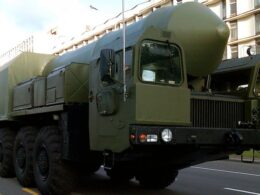Russian officials are escalating nuclear threats toward the United States while President Vladimir Putin touts new nuclear systems. The Institute for the Study of War (ISW) reports that a senior Russian lawmaker suggested Moscow could deploy nuclear-capable missiles to Venezuela and Cuba, invoking Cold War fears just as Putin unveils new underwater and airborne nuclear weapons.
Russia threatens to send nukes to Latin America
On 29 October, Russian State Duma Defense Committee Deputy Chairperson Alexei Zhuravlyov said Moscow could deliver nuclear-capable missiles to “Venezuela or Cuba,” emphasizing their proximity to what he called Russia’s “main geopolitical adversary” — the United States. Zhuravlyov declared that the US is “not a friend or partner” but an “enemy.”
Putin boasts of new nuclear weapons
Putin announced on 29 October that Russia tested its Poseidon nuclear-powered unmanned underwater vehicle a day earlier.
"Putin is detailing the alleged attributes of the weapons to add weight and urgency to his nuclear threats to enact concessions from the United States on Ukraine," ISW wrote.
The timing of Putin’s remarks directly followed US President Donald Trump’s 27 October call for the Kremlin to focus on ending the war in Ukraine instead of testing missiles. Putin’s announcements appear aimed at demonstrating defiance and projecting strength. According to ISW, the Russian leader is using nuclear rhetoric to force concessions from Trump and European governments "that his army cannot achieve on the battlefield."
Belarus to deploy Oreshnik missile system
Russia is also using Belarus to threaten Europe. Belarusian Presidential Press Secretary Natalya Eismont told Kremlin newswire TASS on 28 October that the Oreshnik missile system will go on combat duty in December 2025. Kremlin Spokesperson Dmitry Peskov said the move was a response to what he called “Russophobic statements” and “militaristic hysteria” from Europe.
Peskov pointed to officials in the Baltics, Poland, France, and the United Kingdom as justification for the deployment, calling the system “dear” to both Belarus and Russia. Putin had previously announced that Russian and Belarusian specialists would decide on new deployment sites for Oreshnik by the end of 2025.
"Russia is leveraging the Oreshnik system as part of a reflexive control campaign aimed at undermining Western resolve to militarily support Ukraine," ISW wrote.
Read also
-
Stop fighting now, talk borders later: RFE/RL uncovers EU’s hush-hush plan to lock the Russia-Ukraine war in place
-
Trump says Putin should focus on ending Russia’s war in Ukraine, dismisses Burevestnik missile test
-
ISW: Kremlin may seek off-ramp from nuclear threats through Oreshnik missile promotion





